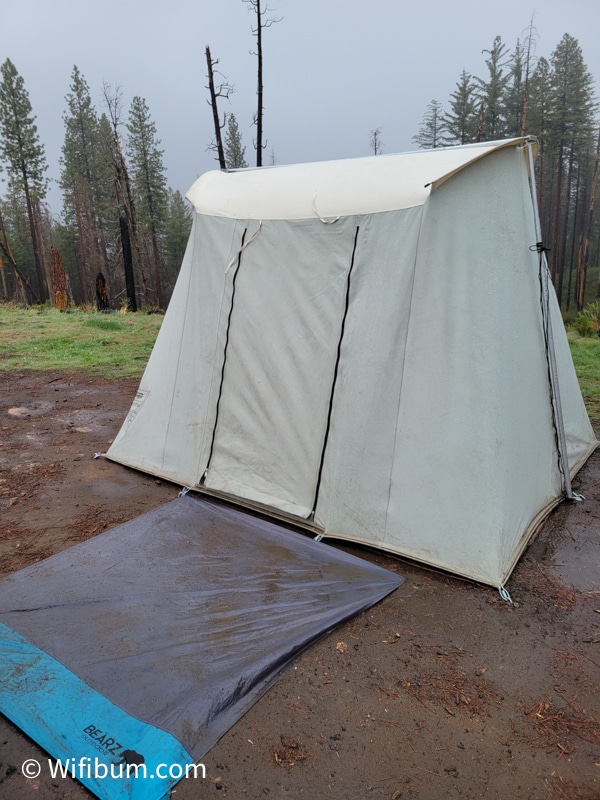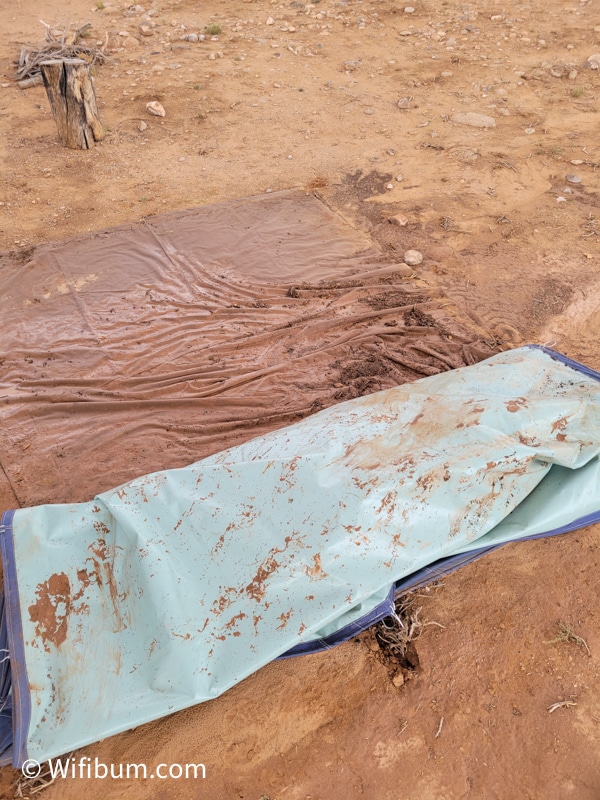Most canvas tents are built to last a “lifetime” of camping with proper care and maintenance.
It’s a key selling point for many first-time canvas tent purchasers.
But there’s a sad reality… most owners will destroy their tents prematurely.
I’m going to go over the fastest way to destroy a canvas tent. Then you can read the “Canvas Tent Oath” to ensure your best canvas tent of choice lasts a lifetime!

How to Destroy a Canvas Tent with Poor Care & Maintenance
1. Storing a Canvas Tent Wet
The quickest way to kill a canvas tent is to store it while wet. It will take a few short days for mold to start thriving.
This is true even for the highest quality canvas tents that will use antifungal agents in their canvas.

While some mold can be treated at early stages, storing it for days and weeks will ensure the entire tent is nothing but a black, moldy mess.
Mold isn’t as simple as a stain on a tent and can be scrubbed off.
If left unchecked, Mold will start on the surface and then work its way into the fibers of the canvas. The enzymes that mold produces will break down the fibers of canvas.
The most popular canvas tents rely on tension for proper setup, this tension requires a strong canvas. Weakened canvas will rip.
Long-Term Use
Storing a tent wet is the quickest way to let mold grow, but it can also grow while your tent is fully set up.
In wet, humid environments, mold can form after days or weeks of the tent being setup if it’s never fully drying.
Make sure to do regular inspections if up for long periods of time. In addition, make sure to buy a canvas tent that is treated with waterproof and antifungal treatments (most tents are, but may not be the default for custom builds or DIY canvas projects).
2. Leave a Canvas Tent Out in the Sun for Extended Periods
Setting up camp and packing up is such a hassle. Instead, leave your canvas tent in the sun for months on your hunting land or in the yard.
Better yet, on extended trips, make sure to set up away from trees and other natural shade.
The UV Rays will relentlessly attack and weaken the canvas and cause it to fade and become brittle. Over time, this will lead to some nice tears and holes in the fabric.
3. Neglect Cleaning Canvas Tents
One of the best ways to contribute to faster mold growth is to never clean your tent.
Let all the spores and other microorganisms fly around and latch onto your tent. They will lay dormant until the conditions are right.
In addition, dirt and debris will accumulate on the canvas. Rolling up the canvas, moving it around, and other micro-movements will help slowly wear at the fabric.

Over the years, this will lead to some nice tears or holes that will make your tent leak.
4. Using Bleach on a Canvas Tent
Using bleach and other harsh chemicals to clean your tent is a great way to kill bacteria.
It’s also a great way to kill the integrity of cotton canvas.
5. Overloading Canvas Tents with Snow or Extra Weight
Overloading your canvas tent is a great way to stress the poles, seams, and fabric to their breaking point.
Make sure to let snow accumulate on the roof to see how much it can hold.
Another great way is to do your own DIY modifications and load the tent in ways it’s not intended.
Other suggestions for destroying canvas tents:
Leave them up in 50+mph hour winds, not using a ground tarp, and more!
—
If your canvas tent doesn’t last 5+ years, there is a good chance it’s from one of those 5 reasons.
Read my complete guide on the best canvas tents for camping.
Proper Care and Maintenance Guide for Canvas Tents
Caring for a canvas tent is a lot like caring for a vehicle.
- Avoid crashes (ie: destroying it),
- Routine oil changes (basic cleaning)
- Occasional maintenance (waterproofing, patching small holes, etc)
The Canvas Tent Maintenance and Care Oath
- I will always store my canvas tent dry, 100% dry. If you have to pack it up wet, set it up ASAP to dry it out.
- I will store my canvas tent in a cool, dry place and not in my damp basement
- I will use a ground tarp underneath my canvas tent to protect the floor
- I will clean my canvas tent when necessary
- I will contact my canvas tent supplier for approved waterproofing agents and cleaning instructions
- If my zipper gets stuck often, I will clean and lubricate it instead of continuously using brute force
- I will collapse my canvas tent in strong winds to avoid pole & canvas damage (ask your canvas tent maker for their suggestions)
- I will avoid spraying bug spray on the tent
- I will not pitch my tent under trees that omit sap
- I will pitch a tarp above my canvas tent if planning on leaving it in the sun for weeks on end
Final Thoughts on Caring for Canvas Tents
High-quality canvas tents should last many, many years of use.
While this wasn’t an exhaustive list of things that can go wrong, it covers a lot of them.
Canvas tents are significant investments compared to nylon and polyester tents.
It’s good to work with the support team for your brand of tent. They will have expert knowledge and know the nuances of their canvas and what products work best for repairs and maintenance.



